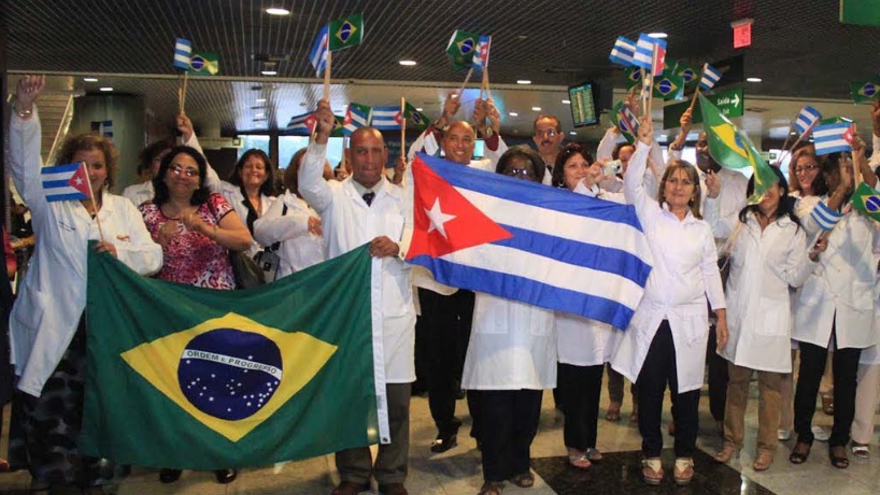
![]() 14ymedio, Havana, January 1, 2019
14ymedio, Havana, January 1, 2019
1. Return of the Mais Médicos doctors
The victory of Jair Bolsonaro in the Brazilian presidential elections will have economic consequences that are as yet unforeseeable for the Government’s coffers because of Cuba’s withdrawal from the program Mais Médicos (More Doctors), which has meant so much revenue for the Island since its beginning in 2013 under the mandate of former president Dilma Rousseff.
The export of Cuban doctors came to an end when the future Government of Brazil declared its will to change the current conditions of the agreement with Havana, among them stopping the paying of salaries to the Cuban State and paying the professionals directly.
Cuban authorities believed that the announcement harmed their interests and questioned the professionalism of their doctors and decided to break with the agreement by which more than 8,300 health workers provided medical assistance in the most remote areas of the country. The repercussions, additionally, affected migratory and legal aspects that will be defined in the new year.
2. Investiture of Miguel Díaz-Canel as president
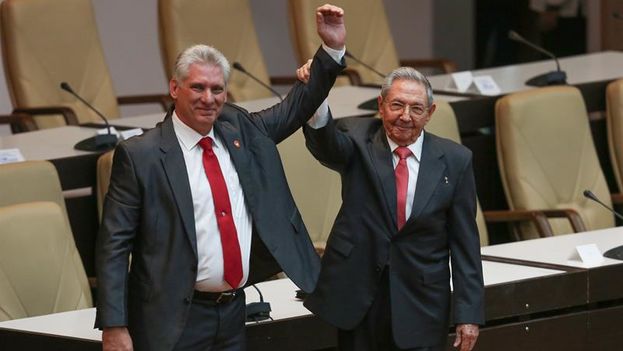
On April 19, 2018 the naming of Miguel Díaz-Canel as president of the Republic of Cuba, the first without the surname of Castro in 50 years, was formalized. His predecessor, Raúl Castro, who saved for himself the general secretaryship of the Communist Party, declared that the election of the new president had not been “a product of pressuring nor of chance.” Previously first vice president, Díaz-Canel headed the nomination list put forward by the Commission of National Candidacy, which was submitted to a vote in Parliament. The new president received 99.83% of votes, 603 of the 604 representatives. Díaz-Canel has slightly modified the style of the Government (he travels more, uses social media, and lets himself be seen frequently with his wife in official acts). Ethics, on the other hand, seem to remain unchanged in regard to the Castro dynasty.
3. Constitutional Reform and the campaign for “No”
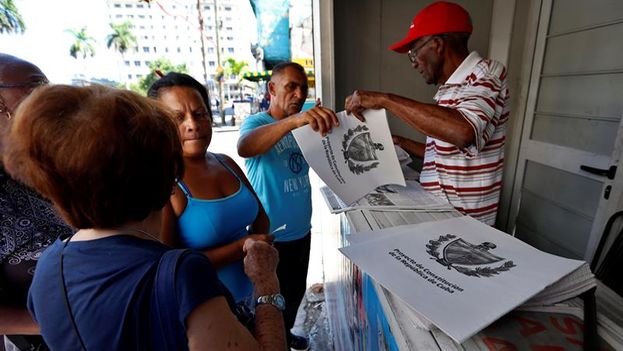
In 2018, after a long wait, the process of constitutional reform began. The principal changes of the draft presented to the citizenry were the elimination of the term “communism” and the acceptance of private property and incorporation of certain economic reforms of “Raulism.” After the citizen debates, the text has passed to the Communist Party and must be approved and submitted to a vote in 2019. Various organizations of the opposition promote the campaign to vote “No” to not legitimize a system that continues to lack multiple parties and public liberties for its citizens.
4. Controversy over the inclusion of Article 68 in the constitutional reform
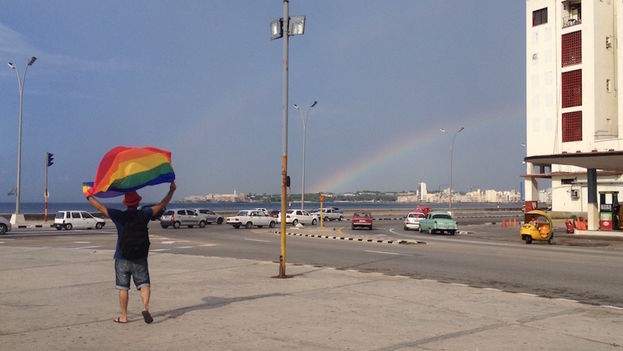
The draft of the Constitutional reform opens the door to marriage equality by modifying the definition of this type of unions, which would be between two persons rather than between man and woman. This change set off an important controversy between gay rights organizations and Christian churches. The Catholic church has positioned itself against it, but the evangelicals are the ones who have decided to mobilize more and start various campaigns and signature gathering to try to block this change. In the end, the draft will not include the planned change in the constitution, which establishes that marriage is a “social and legal institution.” The Family Code will be what establishes, in the future, who can engage in it.
5. The arrival of Alberto and Michael
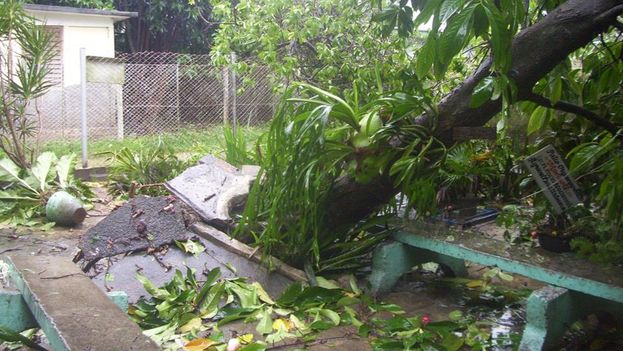
In May, the subtropical storm Albert flooded the central area of the Island, causing four deaths and grave damages to infrastructure, homes, and crops. The provinces of Cienfuegos, Sancti Spíritus, and Villa Clara received the worst of the flooding that left cuts in communication and the evacuation of thousands of residents.
Months later, at the beginning of October, Michael grazed one end of Cuba as a category 1 hurricane on the Saffir Simpson scale. The Island didn’t have to lament a single death, although numerous material damages were recorded, particularly in Pinar del Río, where 87% of the population was left without electricity and tobacco harvests were severely damaged. The floods delayed the sowing of the plant in the province with the greatest tobacco production.
Isla de la Juventud also suffered the battering of the cyclone, whose rains flooded homes, infrastructure, and crops and caused electricity cuts. On its route toward the United States the impact was greater and Michael left 18 deaths in Florida and Georgia.
6. Cubana de Aviación flight crash with 112 deaths
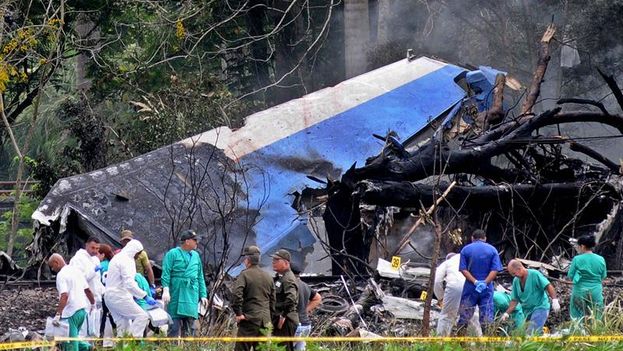
Fifteen minutes after taking off from José Martí International Airport in Havana en route to Holguín, Cubana de Aviación flight 972, operated by the Mexican airline Global Air, crashed with 113 occupants on board. Of the three initial survivors only one remains, young Maylén Díaz. The vast majority of the deceased were from Holguín, although also lost were the lives of two Argentineans, one Mexican, and two Sahara natives, one with Spanish nationality. The entire crew was Mexican. The company had been accused of various irregularities by some of its workers and the pilots’ union of that country. The causes of the accident are still to be determined and the investigation continues coordinated by Cuban, American, and Mexican authorities.
7. The controversial Decree 349

Independent artists saw how their creative possibilities outside of State organizations were limited with the approval of Decree 349, which went into effect December 7 although pressures have obligated the government to not implement all the controls over the culture they were planning. Some of the artists decided to go to battle with protests that resulted in multiple arrests, but they had a small triumph when the minister of culture, Alpidio Alonso, announced a few days ago that the decree will be applied in an “agreed” and “gradual” manner.
8. Failure of the sugar harvest

The last sugar harvest produced a little more than a million tons of raw sugar, far from the 1.6 million that the sector’s authorities had suggested. The repercussions have not been small. Cuba, previously the sugar-producing country par excellence, has seen itself obligated to import this product from France for the basic market basket. The sector, whose weight was essential in the Cuban economy, has for years seen spectacular falls, remaining far behind revenues received from the export of medical services, remittances, and tourism.
9. Increase of shortages in food and medicine
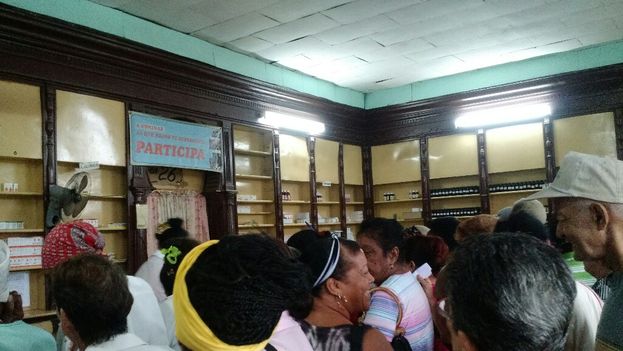
Since the beginning of the past year the shortage of food and medicine has been worsening on the island. The lack of cash flow to buy raw material had a bearing on the lack of medicines in the network of state-owned pharmacies, especially those meant for chronic patients. Food products were also scarce and in the second half of 2018 flour, oil, and eggs were missing from the shelves of stores. Authorities blamed the problem on delays in imports and difficulties with infrastructure.
10. Stagnation of GDP
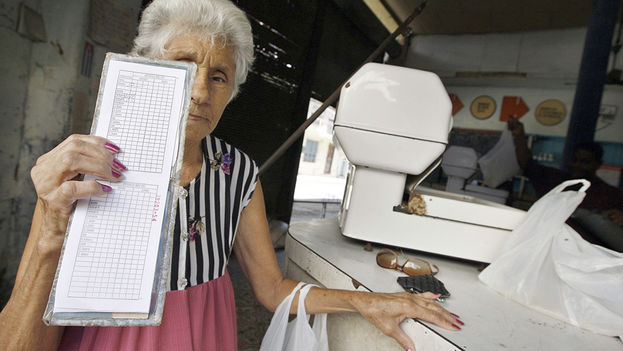
The economy of Cuba, according to data released by the minister of economy and planning, Alejandro Gil, shows that the gross domestic product (GDP) has registered a growth of 1% in 2018, well below the 2% that was officially predicted. The Government attributes this poor result to the failure in export revenue, the high level of debt, the international context, and the weather, but independent experts think that the problems are deeper.
According to the Cuban economist Pavel Vidal, who lives in Colombia, “the shortage of basic products and the dynamic of prices of consumer goods match up less and less with the official statistics of GDP and of the Index of Consumer Prices.”
11. Arrival of internet to mobile phones
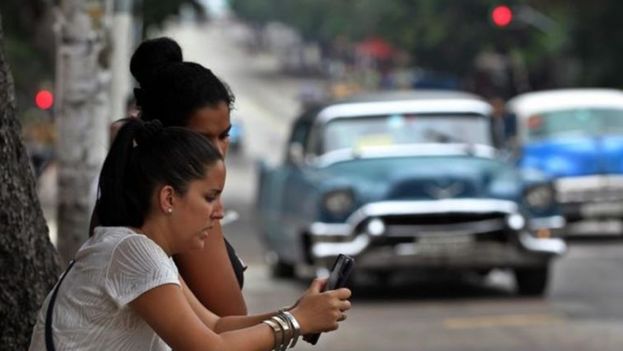
After years of waiting, on December 6 Cuba’s state communications company, Etecsa, fulfilled, almost at the last moment, its commitment to bring internet to mobile phones in 2018. During the summer various tests were done to check the functioning of the system, but it ended up being a fiasco that made people fear that the announcement wouldn’t meet the deadline. Although the price of navigation packages is rather high, 4 gigabytes of connection costs around 30 CUC, the equivalent of a monthly salary, the new functionality opens up a new path for activism and entrepreneurship.
12. Continuation of the “sonic attack” controversy
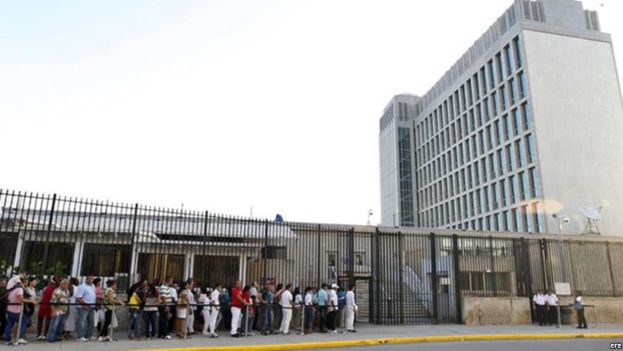
The United States and Cuba remain entangled over the matter of the supposed “sonic attacks.” Throughout the year and after several investigations in both countries, the cause of the harm (which in fact was proven) suffered by various diplomats stationed in Havana between 2016 and 2017 has still not been able to be determined. Also this year complaints of affected Canadians have come to light, and the Canadians have lamented that their Government has not given them a treatment equal to that of Washington to its officials. The last episode of this crisis has been the closure of consular services in the US embassy on the Island, which have now come to be processed mainly in Guyana.
13. Visit of Pedro Sánchez
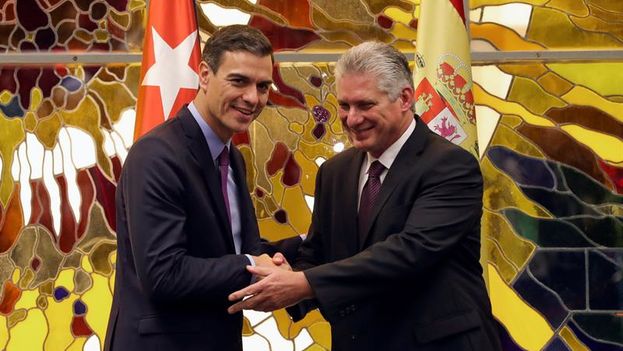
On December 22 and 23, Pedro Sánchez, president of the Spanish Government traveled to Cuba on an official visit, the first of this level from a leader of his country in 32 years. Although economic relations between both countries have been the best — under the mandates of José María Aznar, José Luis Rodríguez Zapatero, and Mariano Rajoy — political ties have been limited. In Cuba Sánchez had meetings with the president and authorities as well as with Spanish businessmen and part of civil society, but he did not meet with anyone from the opposition. Both parties agreed to meet annually to go over cultural cooperation agreements and bilateral reviews. Among the principal deals reached, the installation of farms to provide chicken to Cubans was one of the most discussed.
14. Historic agreement of the Cuban Baseball Federation with the Major Leagues of the United States
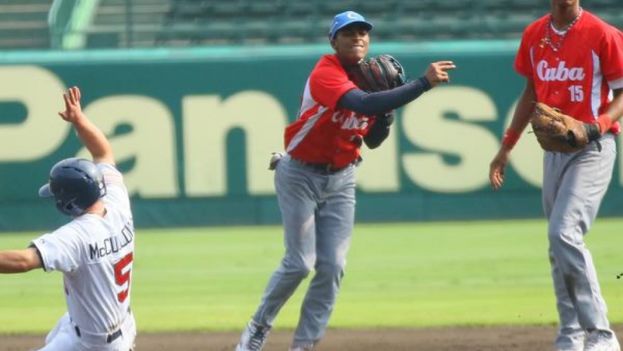
In the middle of December it was announced that the Cuban Baseball Federation (FCB) and Major League Baseball (MLB) signed a historic agreement so that the Island’s ballplayers could be signed in the United States. The agreement opens the doors so that athletes who play in the National Series and other local circuits can join the 30 teams of the MLB, and arrives during a year of disastrous results for Cuban baseball.
In 2018 Cubans won only a bronze in the Panamerican U-12 and a silver in the Games in Barranquilla. In U-15, Cuba came in fifth place. In the Caribbean Series, the Alazanes fell in the semifinals. In U-18 they didn’t manage to pass the super round of six in the Panamerican series and Cuba will not be in the next World Cup.
All the same, the public has attended with astonishing interest the National Series, filling the stadiums despite the apathy. On a more human level, sanctions and conflicts because of the bad conduct of some players and managers have not at all helped the image of the game.
Translated by: Sheilagh Carey
_________________________
The 14ymedio team is committed to serious journalism that reflects the reality of deep Cuba. Thank you for joining us on this long road. We invite you to continue supporting us, but this time by becoming a member of 14ymedio. Together we can continue to transform journalism in Cuba.
